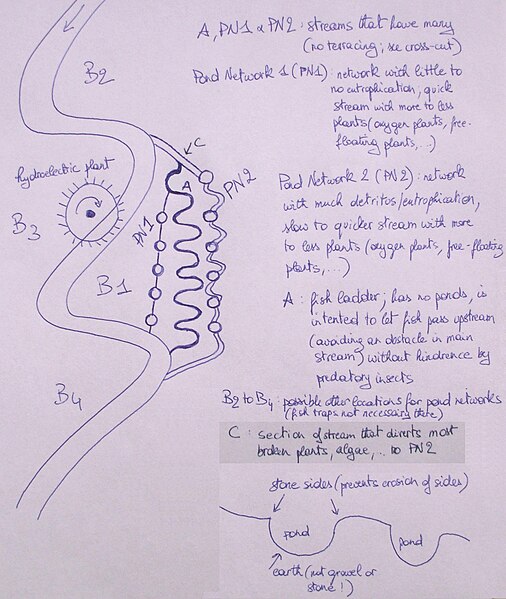
Size of this preview: 506 × 599 pixels. Other resolutions: 203 × 240 pixels | 405 × 480 pixels | 649 × 768 pixels | 865 × 1,024 pixels | 1,804 × 2,136 pixels.
Original file (1,804 × 2,136 pixels, file size: 317 KB, MIME type: image/jpeg)
This file is from Wikimedia Commons and may be used by other projects. The description on its file description page there is shown below.
Summary
| DescriptionFish ladder with pond networks.JPG |
English: Schematic showing the construction of streams (tributaries) on a fish ladder, so as to provide a diverse range of environments for a variety of (predatory) insects. The idea is similar to making insect hotels but then for aquatic insects.
The main reasons why pond networks can provide much environmental benefit and restore some of the aquatic biodiversity are:
Some examples of what organisms would live in which pond network (example for Europe):
|
| Date | |
| Source | Own work |
| Author | KVDP |
Licensing
I, the copyright holder of this work, hereby publish it under the following license:
This file is licensed under the Creative Commons Attribution-Share Alike 3.0 Unported license.
- You are free:
- to share – to copy, distribute and transmit the work
- to remix – to adapt the work
- Under the following conditions:
- attribution – You must give appropriate credit, provide a link to the license, and indicate if changes were made. You may do so in any reasonable manner, but not in any way that suggests the licensor endorses you or your use.
- share alike – If you remix, transform, or build upon the material, you must distribute your contributions under the same or compatible license as the original.
Captions
Add a one-line explanation of what this file represents
Items portrayed in this file
depicts
16 June 2013
File history
Click on a date/time to view the file as it appeared at that time.
| Date/Time | Thumbnail | Dimensions | User | Comment | |
|---|---|---|---|---|---|
| current | 08:11, 23 May 2013 |  | 1,804 × 2,136 (317 KB) | wikimediacommons>Genetics4good | User created page with UploadWizard |
File usage
The following page uses this file:
Retrieved from "https://www.appropedia.org/File:Fish_ladder_with_pond_networks.JPG"
Cookies help us deliver our services. By using our services, you agree to our use of cookies.